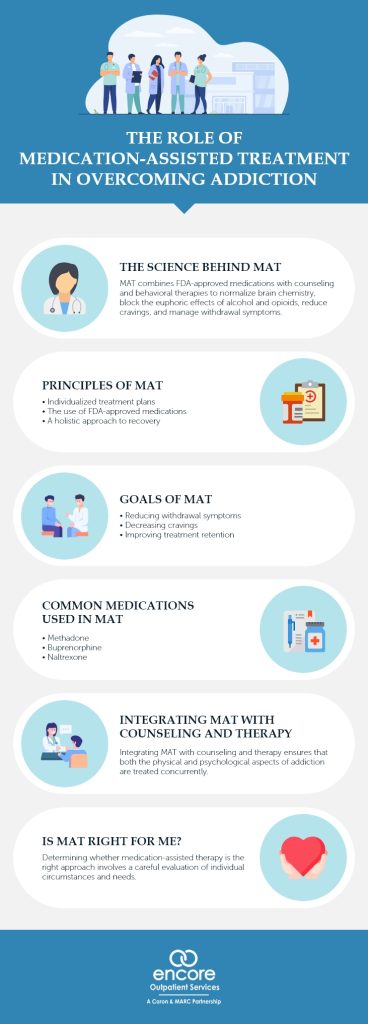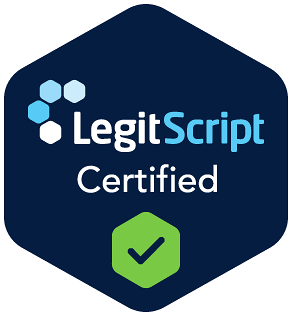Our dedication lies not just in treating symptoms but in addressing the root causes, offering a holistic approach that integrates the best of therapeutic practices with the warmth of community support.
The Role of Medication-Assisted Treatment in Overcoming Addiction

Medication-assisted treatment (MAT) has emerged as a crucial and transformative approach to battling addiction, especially to opioids and alcohol. It involves the integration of FDA-approved medications with counseling and behavioral therapies to offer a comprehensive approach to addressing both the physiological and psychological facets of addiction. This article aims to examine the pivotal role of medication-assisted treatment in overcoming addiction, emphasizing its capacity to foster lasting recovery. By providing a balanced view of its effectiveness and addressing common misconceptions, this article aims to offer an informative and comprehensive understanding of MAT as a pivotal component in the journey to recovery.
Understanding Addiction
Addiction is a complex and multifaceted condition characterized by the compulsive use of substances despite harmful consequences. It’s recognized as a chronic brain disorder that involves a combination of genetic, environmental, and psychological factors. The process of addiction begins when a substance alters the brain’s reward system, leading to increased cravings and a loss of control over usage. Over time, individuals may develop a tolerance, need more of the substance to achieve the same effect, and experience withdrawal symptoms when not using it. This cycle impacts daily functioning and health, making it challenging for affected individuals to abstain without help. Understanding addiction as a medical condition rather than a moral failing is crucial in developing compassionate and effective treatment strategies, including the use of MAT to support recovery and improve quality of life.
The Science Behind MAT
The science behind medication-assisted treatment is grounded in its ability to address the neurological and behavioral aspects of addiction. MAT medications interact with the same brain receptors as the addictive substance but in a controlled and safer manner. These medications help normalize brain chemistry, block the euphoric effects of alcohol and opioids, and regulate body functions affected by addiction. The behavioral therapies integrated with MAT are designed to enhance motivation, build coping skills, and address any underlying mental health conditions. This combination allows individuals to focus on recovery and rebuilding their lives without the constant physical and psychological battles associated with addiction. By targeting both the physical and behavioral aspects of the disorder, MAT provides a more comprehensive and effective approach to treating substance use disorders.
Principles of MAT
Medication-assisted treatment operates on several key principles that underpin its evidence-based approach to addressing substance use disorders. These principles are instrumental in ensuring the effective and ethical implementation of MAT.
Here are the core principles of MAT:
- Individualized Treatment Plans – MAT recognizes the uniqueness of each individual’s experience with addiction. Thus, treatment plans are tailored to the specific requirements, preferences, and circumstances of the person receiving care.
- Use of FDA-Approved Medications – MAT programs incorporate certain medications to stabilize brain chemistry, reduce cravings, and manage withdrawal symptoms.
- Focus on Ongoing Assessment and Adjustments – Treatment plans undergo regular assessment and adjustment based on individual progress and changing needs. This dynamic approach allows for flexibility in addressing evolving challenges and goals.
- Comprehensive Care – MAT is most effective when integrated into a comprehensive treatment plan. This involves collaboration with other treatment providers, mental health professionals, and support services to address various aspects of an individual’s well-being.
- Patient Education and Informed Consent – This ensures that patients are fully informed about the benefits and risks of MAT and are involved in making decisions about their treatment plan.
- Holistic Approach to Recovery – MAT recognizes that recovery involves more than just abstaining from alcohol or opioids. Thus, it aims to support the individual’s overall well-being, enabling them to regain control over their lives and improve their quality of life.
These principles collectively emphasize a person-centered, evidence-based, and compassionate approach to addressing substance use disorders. By integrating medications with comprehensive care, MAT seeks to enhance the effectiveness of addiction treatment and improve the overall quality of life for those on the path to recovery.

Goals of MAT
The goals of medication-assisted treatment programs are designed to provide a comprehensive and effective approach to addiction recovery.
- Reducing Withdrawal Symptoms – MAT aims to alleviate the physical discomfort and psychological distress associated with withdrawal, making the recovery process more manageable.
- Decreasing Cravings – By stabilizing brain chemistry, MAT helps reduce the intense cravings often associated with addiction, thereby lowering the risk of relapse.
- Improving Treatment Retention – By addressing the physical aspects of addiction, MAT encourages continued participation in treatment programs and counseling.
- Enhancing Social Functioning – MAT supports individuals in rebuilding their lives and improving relationships, employment status, and overall societal participation.
- Reducing Risk of Overdose – By providing controlled medication and reducing substance use, MAT significantly lowers the risk of a potentially fatal overdose.
- Promoting Holistic Health – Beyond addressing addiction, MAT aims to improve the overall physical and mental health of the individual, paving the way for a healthier, more stable lifestyle.
These goals collectively contribute to a more effective and sustainable recovery journey, emphasizing health, well-being, and the ability to lead a self-directed life free from addiction.
Common Medications Used in MAT
The Food and Drug Administration (FDA) has approved several medications for MAT programs to address various aspects of addiction. These medications include:
- Methadone – An opioid agonist that reduces withdrawal symptoms and cravings by acting on the same brain receptors as other opioids. Methadone is used primarily for opioid addiction and is administered under strict clinical supervision.
- Buprenorphine – A partial opioid agonist that helps reduce cravings and withdrawal symptoms without producing the same high as other opioids. Buprenorphine’s ceiling effect lowers the risk of misuse, dependency, and side effects.
- Naltrexone – An opioid antagonist used for both opioid and alcohol addiction. Naltrexone blocks the euphoric and sedative effects of opioids and reduces the desire to drink alcohol.
- Disulfiram – Used for treating alcohol dependence, Disulfiram discourages drinking by causing unpleasant effects when alcohol is consumed.
- Acamprosate – Prescribed for alcohol addiction, Acamprosate helps restore the brain’s balance and reduces the physical and emotional discomfort experienced during the early stages of recovery.
These medications, when used as part of a comprehensive MAT program that includes counseling and behavioral therapies, can significantly improve the chances of recovery and enhance the quality of life for individuals with alcohol and opioid dependence.
Integrating MAT With Counseling and Therapy
Integrating MAT with counseling and therapy is crucial for addressing the comprehensive needs of individuals with substance use disorders. This integrated approach ensures that both the physical and psychological aspects of addiction are treated concurrently.
Key components include:
- Individual Counseling – One-on-one sessions provide a safe space for individuals to explore the underlying causes of their addiction, develop coping strategies, and set personal recovery goals.
- Group Therapy – Group sessions offer peer support and the opportunity to learn from others’ experiences, fostering a sense of community and shared purpose in the recovery journey.
- Behavioral Therapies – Therapies like Cognitive Behavioral Therapy (CBT) and Dialectical Behavior Therapy (DBT) help modify harmful behaviors and thought patterns associated with substance use.
- Family Therapy – Involving family members in the treatment process can improve communication, heal relationships, and create a supportive home environment conducive to recovery.
- Trauma-Informed Therapy – Recognizing the impact of trauma on substance use and recovery, this therapy helps individuals address underlying issues and develop coping mechanisms that support recovery.
- Educational Programs – Education about the nature of addiction, the recovery process, and relapse prevention strategies empowers individuals to take control of their recovery journey.
Integrating these therapeutic elements with MAT creates a well-rounded treatment plan that addresses the multifaceted nature of addiction, enhancing the likelihood of long-term recovery and a return to a healthy, productive life.
Addressing Myths and Misconceptions
Addressing myths and misconceptions is vital in understanding and accepting MAT as an effective approach to addiction recovery. Common myths include:
- Myth: MAT replaces one addiction with another.
- Fact: MAT medications stabilize brain chemistry and reduce cravings and withdrawal symptoms, helping individuals stop using harmful substances without experiencing the high.
- Myth: MAT isn’t necessary if one is strong enough.
- Fact: Addiction is a medical condition, not a weakness. MAT provides essential medical support in the same way that other chronic conditions are treated with medication.
- Myth: MAT is only for severe cases.
- Fact: MAT is beneficial for various stages of addiction and can be tailored to suit individual needs, from mild to severe cases.
- Myth: MAT isn’t effective because it doesn’t address the underlying causes of addiction.
- Fact: When integrated with counseling and behavioral therapies, MAT addresses both the physical and psychological aspects of addiction, offering a comprehensive approach to recovery.
Dispelling misconceptions is crucial for individuals, families, and communities to understand and embrace the benefits of MAT as a legitimate, effective, and valuable tool in the treatment of substance use disorders.
Is MAT Right for Me?
Determining whether medication-assisted therapy is the right approach involves a careful evaluation of individual circumstances and needs.
Consider the following factors:
- Nature of Addiction – MAT is commonly employed for the treatment of opioid use disorder and alcoholism. If you are struggling with these substances, MAT may be a suitable option.
- Medical History – A thorough medical evaluation can help determine if MAT medications are safe and appropriate, considering any other health conditions or medications.
- Treatment Goals – Aligning MAT with your recovery goals is important. It’s beneficial for those seeking a comprehensive approach that includes both medical and therapeutic support.
- Readiness for Comprehensive Treatment – MAT is most effective when combined with counseling and behavioral therapies. Willingness to engage in these aspects is important.
- Previous Treatment Experiences – If past attempts at recovery were unsuccessful, MAT might offer a different, more effective approach.
- Support System – Having a supportive environment can enhance MAT’s effectiveness. Consider your access to supportive healthcare providers, family, and community resources.
Consulting with a healthcare professional specializing in addiction treatment is the best way to determine if MAT is appropriate for you. They can provide a personalized assessment and discuss the potential benefits and considerations based on your specific situation.
If you or someone you know is struggling with addiction and co-occurring mental health conditions, Encore Outpatient Services is here to help. As a licensed treatment provider, we recognize the power of evidence-based treatments and their proven success in addiction recovery. Our approach to treatment is rooted in personalized care, ensuring that your unique needs are met with precision and compassion. We encourage you to take the first step towards a healthier, more stable future. Contact Encore Outpatient Services today to learn how our experienced team can support you on your journey to recovery. Your path to a better life begins with a single call.
Let Us Support You On Your Recovery Journey!
Copyright 2026 Encore Outpatient Services | All Rights Reserved



